Poems:
Favorite lines from "In Her Splendor Islanded":
Here is the moment burning and returned
Drowning itself in itself and never consumed
Biographies and Criticisms:

APB-SAL is a blog about education, science, science education, fiction, science fiction, literature, literary stories, poetry, and anything else that strikes the blogger's fancy. NOTE: This blog interrogates art. It rarely make moral proclamations. For that attend the church or politician of your choice. This blog concerns aesthetics, not propaganda. Consider this as interviews with books where the interviewer presents interviewees, so you get what you need to do your own thinking.
Poems:
Here is the moment burning and returned
Drowning itself in itself and never consumed
Biographies and Criticisms:
"People expect that their lives move in majestic sweeps, but that’s only because memory and legend work that way, but reality works in the small moments of our experience. Too Heavy to Carry explores those moments by focusing in close. This wonderful collection aims to name the evils that people live through: loneliness, betrayal, inadequacy, and loss. Dixon easily captures not just the glimpse of hope, but shows the agony and obstacles one must endure before she crawls out of the bottom of the well. This is a must for survivors of any variety—divorce, depression, domestic violence, abandonment/neglect and other painful experiences."Her poetry is often visceral as if carved out with a blunt instrument. Here's a video interview with the poet and a brief excerpt. Here's her website with a few sample poems.
 by Ken Goldman
by Ken Goldman The main critique about the above book actually intrigues me more.Other Worlds, Better Lives:
Interview focuses on people involved with Destination Moon. It's early in TV's career as the reporters waste too much time boggling at their own wonder--either of being on TV or of being on a movie set."Flannery O’Connor on Why the Grotesque Appeals to Us, Plus a Rare Recording of Her Reading"
"In My Craft or Sullen Art" by Dylan Thomas:
A recent speech at Yale inadvertently sums up what's wrong with the art form these days: Its gatekeepers believe poetry matters because it's poetry, not because of what it says by NOAH BERLATSKY
 ---
--- First appeared in Weird Tales, reprinted by Phyllis Cerf Wagner, Herbert Wise, Betty M. Owen, Robert M. Price, Tom English, Gwendolyn Toynton, John Gregory Betancourt, Colin Azariah-Kribbs, Jeff VanderMeer, and Ann VanderMeer.
First appeared in Weird Tales, reprinted by Phyllis Cerf Wagner, Herbert Wise, Betty M. Owen, Robert M. Price, Tom English, Gwendolyn Toynton, John Gregory Betancourt, Colin Azariah-Kribbs, Jeff VanderMeer, and Ann VanderMeer.  There are several in-memoriams. Here are some of the best:
There are several in-memoriams. Here are some of the best:Your price:
Pay over the average of $10.76 to unlock
Pay $15 or more to unlock
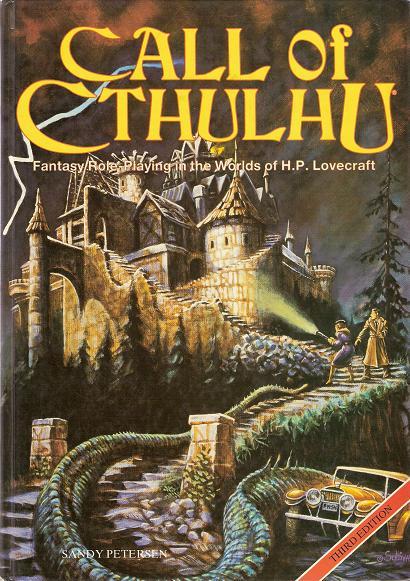 First appeared in Weird Tales, reprinted by T. Everett Harré, August Derleth, Peter Haining, Les Daniels, David G. Hartwell, Robert M. Price, Leslie Pockell, S. T. Joshi, John Gregory Betancourt, Colin Azariah-Kribbs--gaining more import in later years. It has spawned a movie, role-playing games and a radio drama.
First appeared in Weird Tales, reprinted by T. Everett Harré, August Derleth, Peter Haining, Les Daniels, David G. Hartwell, Robert M. Price, Leslie Pockell, S. T. Joshi, John Gregory Betancourt, Colin Azariah-Kribbs--gaining more import in later years. It has spawned a movie, role-playing games and a radio drama.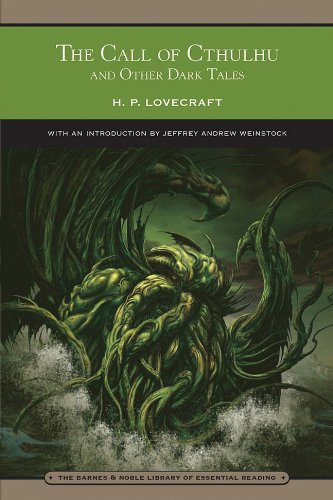 II. The Tale of Inspector Legrasse
II. The Tale of Inspector Legrasse While Robert E. Howard and Michel Houellebecq consider this one of Lovecraft's best, E. F. Bleiler called it "a fragmented essay with narrative inclusions". Both views shed insight. The piecemeal effect creates a sense of deep-time, as if this has a long history. The style is much like an essay, but much of Lovecraft has a distancing effect as if it were an essay written more for veracity than for moving the reader. Events are told at a distance both in time and at a remove through secondary narrators. We do not feel the events directly.
While Robert E. Howard and Michel Houellebecq consider this one of Lovecraft's best, E. F. Bleiler called it "a fragmented essay with narrative inclusions". Both views shed insight. The piecemeal effect creates a sense of deep-time, as if this has a long history. The style is much like an essay, but much of Lovecraft has a distancing effect as if it were an essay written more for veracity than for moving the reader. Events are told at a distance both in time and at a remove through secondary narrators. We do not feel the events directly.--Don't tell me _____. Unless you're speaking McNuggets into my hands, I don't want to hear it.
--Ma'am, it's 10:30 am. We don't serve Chicken McNuggets at this time.
--Yes, you do.
--No, we don't.
--Why not?
--You know what? Rawr!
--Did you just hiss at me?
--I'll do more than just _____ hiss at you.
--Yeah, get your skinny ___ out of the car.
--Don't you _______ run away from me, you fat meatbag, I will end you.
Don't make me assume my ultimate form, I will ______ wreck--
--Just wait. I'm gonna come in there, and I'm going to wreck you.
--Do you know who I am? Rawr. Rawr!
--You want a piece of me? I will go super saiyan.
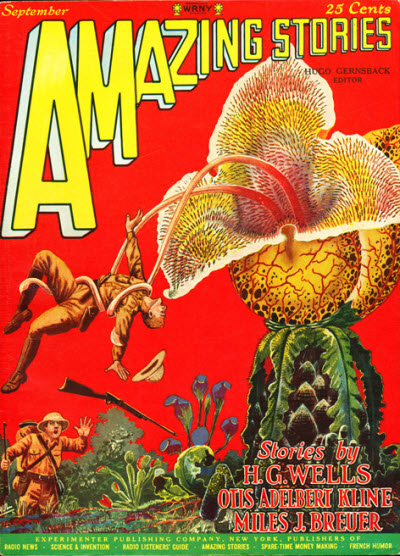 First appeared in Amazing Stories, reprinted by August Derleth, Mary Gnaedinger, Groff Conklin, Sam Moskowitz, Bryan A. Netherwood, Leslie A. Fiedler, Peter Haining, Martin H. Greenberg, Robert Weinberg, Stefan Dziemianowicz, Mike Baker, Garyn G. Roberts, Michael Kelahan, Guy Anthony De Marco, John Gregory Betancourt, Colin Azariah-Kribbs--a few of which were genre retrospectives. A movie (see trailer below) and radio dramas have sprouted from this tale.
First appeared in Amazing Stories, reprinted by August Derleth, Mary Gnaedinger, Groff Conklin, Sam Moskowitz, Bryan A. Netherwood, Leslie A. Fiedler, Peter Haining, Martin H. Greenberg, Robert Weinberg, Stefan Dziemianowicz, Mike Baker, Garyn G. Roberts, Michael Kelahan, Guy Anthony De Marco, John Gregory Betancourt, Colin Azariah-Kribbs--a few of which were genre retrospectives. A movie (see trailer below) and radio dramas have sprouted from this tale. The crops look exceedingly large and tasty, but they are laced with bitterness. The family moves the cows far from the home, so their milk isn't tainted. The grass and plants turn grey and brittle. The family gradually grows insane. Sons throw themselves into the well. When a family friend stops by, the family is gone, only scuttling creatures that decay remain. The property glows.
The crops look exceedingly large and tasty, but they are laced with bitterness. The family moves the cows far from the home, so their milk isn't tainted. The grass and plants turn grey and brittle. The family gradually grows insane. Sons throw themselves into the well. When a family friend stops by, the family is gone, only scuttling creatures that decay remain. The property glows. As a straight-forward piece, unlaced by cumbersome, fulsome, fearsome, and other over-complicated "Cyclopean" adjectives--so many adjectives that you forget what the sentence was about--this work has more energy than others.
As a straight-forward piece, unlaced by cumbersome, fulsome, fearsome, and other over-complicated "Cyclopean" adjectives--so many adjectives that you forget what the sentence was about--this work has more energy than others.
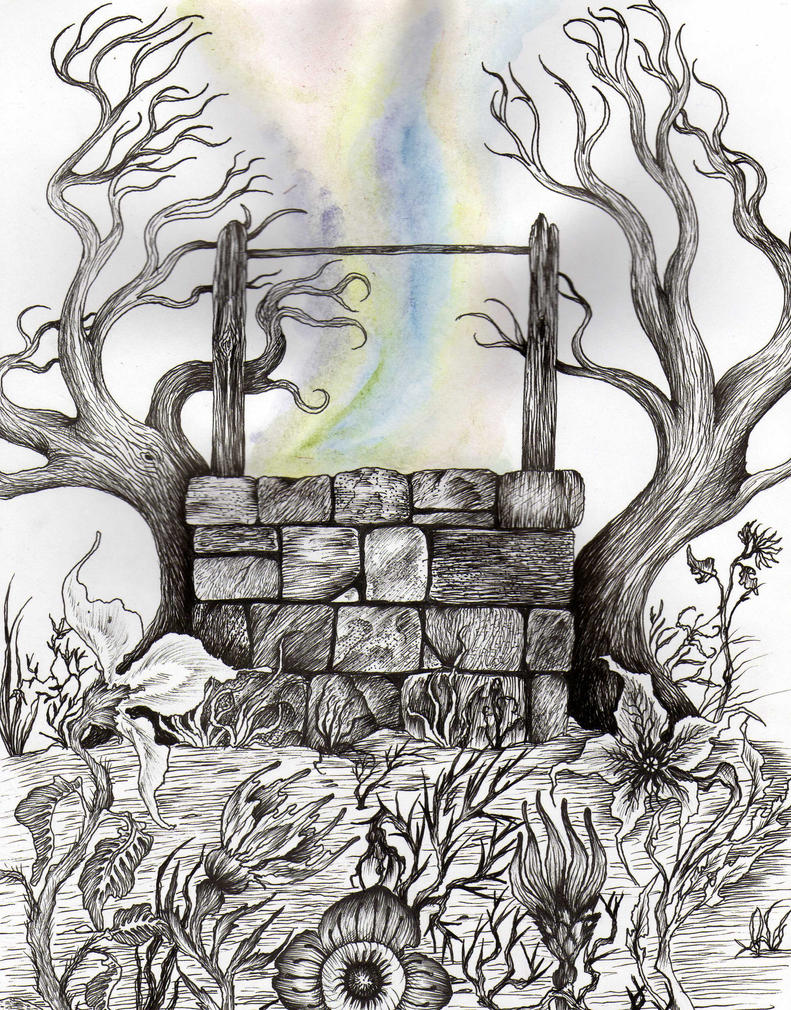
10 Plants that Shook the World Gillian Richardson, authorKim Rosen, illustratorAnnick Press Ltd.
 The ten plants are papyrus (writing), pepper (spice trade), tea, sugarcane, cotton (clothing), cacao, cinchona, rubber, potato, and corn. What makes this fascinating or unusual is that it's usually the machines we focus on having changed the world (and they have) as opposed to the plants that occur naturally. If you doubt their importance, Richardson points out that wars were fought over these plants.
The ten plants are papyrus (writing), pepper (spice trade), tea, sugarcane, cotton (clothing), cacao, cinchona, rubber, potato, and corn. What makes this fascinating or unusual is that it's usually the machines we focus on having changed the world (and they have) as opposed to the plants that occur naturally. If you doubt their importance, Richardson points out that wars were fought over these plants."[P]epper has another, unexpected effect. It can make you sneeze. Achoo!"Richardson occasionally tells things that needn't be told but on the whole, the balance of interesting information weighs in its favor. Richardson, also performs well on the delivery of information: boxes of information describing the plants' born, age, likes, dislikes, stats, history of names, pros + cons, facts, as well as other related information tightly packaged in a few paragraphs, trying to capture the impact these plants have made on civilization.
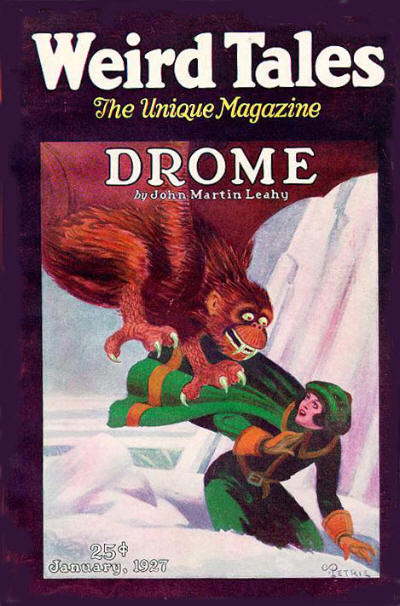 First published by Weird Tales, reprinted by Christine Campbell Thomson, Herbert Asbury, Charles M. Collins, August Derleth, and Barry J. Gillis. Free online.
First published by Weird Tales, reprinted by Christine Campbell Thomson, Herbert Asbury, Charles M. Collins, August Derleth, and Barry J. Gillis. Free online."The idea that black magic exists in secret today, or that hellish antique rites still exist in obscurity, is one that I have used and shall use again. When you see my new tale "The Horror at Red Hook", you will see what use I make of the idea in connexion with the gangs of young loafers & herds of evil-looking foreigners that one sees everywhere in New York."
 From our twenty-first-century perspective, the tale's origin is an embarrassment of racism, yet Lovecraft's influence permeates the genre and wider culture. We need to understand where we've come from. Plus, it's too easy to be dismissive of times other than one's own. As Roger Luckhurst points out in his introduction to Oxford University Press's The Classic Horror Stories by H. P. Lovecraft, following the millions devastated by W.W.I and the Spanish flu, western civilization was felt to be on the decline. Moreover, social Darwinism gave racism an intellectual justification, with such prominent proponents as Jack London. Lovecraft likely considered himself an intellectual studying myth and even penning a chemistry textbook.
From our twenty-first-century perspective, the tale's origin is an embarrassment of racism, yet Lovecraft's influence permeates the genre and wider culture. We need to understand where we've come from. Plus, it's too easy to be dismissive of times other than one's own. As Roger Luckhurst points out in his introduction to Oxford University Press's The Classic Horror Stories by H. P. Lovecraft, following the millions devastated by W.W.I and the Spanish flu, western civilization was felt to be on the decline. Moreover, social Darwinism gave racism an intellectual justification, with such prominent proponents as Jack London. Lovecraft likely considered himself an intellectual studying myth and even penning a chemistry textbook."It is possible that man may sometimes return on the track of evolution, and it is my belief that an awful lore is not yet dead.”So we witness the typical, inevitable doom of the Lovecraftian tale. His life mirrored civilization, and his fiction mirrored both. While many critics are dismissive of this tale, Lockhurst sets the story in a primary position, and it does appear to illuminate Lovecraft's work.
 Paul di Filippo directs our attention to Greek writer, Diamandis Florakis, who has several free ebooks available:
Paul di Filippo directs our attention to Greek writer, Diamandis Florakis, who has several free ebooks available: Portable Childhoods was nominated for a World Fantasy Award. With such charm and wit, it's easy to see why. While her work isn't always plotted, often other pleasures abound. I especially recommend "Ringing Up Baby" and "In the House of the Seven Librarians." For easy reference, here is an index to stories I've looked at so far:
Portable Childhoods was nominated for a World Fantasy Award. With such charm and wit, it's easy to see why. While her work isn't always plotted, often other pleasures abound. I especially recommend "Ringing Up Baby" and "In the House of the Seven Librarians." For easy reference, here is an index to stories I've looked at so far:"Time" isn't really a theme, per se. But I want poems having to do with time. Not just time travel, but poems in which the passage of time, or other aspects of time, play a role. You can start submitting now; just earmark submissions for #100.
 Lanchi Ronpa, grandson of an English expat, has lived in the Incan Empire. He is called on to translate between an American and the god-emperor himself. The American claims to ave a cure for small pox and is willing to give it in exchange for 4,000 times his weight in gold, the weight of the sunrise. What he doesn't know is that the Incans don't see gold as money but as spiritual. They will have to sacrifice 1200 to appease the gods for this trade.
Lanchi Ronpa, grandson of an English expat, has lived in the Incan Empire. He is called on to translate between an American and the god-emperor himself. The American claims to ave a cure for small pox and is willing to give it in exchange for 4,000 times his weight in gold, the weight of the sunrise. What he doesn't know is that the Incans don't see gold as money but as spiritual. They will have to sacrifice 1200 to appease the gods for this trade. First appeared in Strange Horizons. Reprinted by Peter Straub's view of the new horror in Poe's Children. It was up for a Locus award.
First appeared in Strange Horizons. Reprinted by Peter Straub's view of the new horror in Poe's Children. It was up for a Locus award. 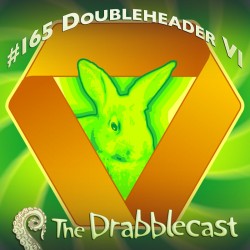 First appeared in Portable Childhoods. Reprinted in audio.
First appeared in Portable Childhoods. Reprinted in audio. 
 First appeared in Strange Horizons. Reprinted by Jonathan Strahan's Year's Best and in audio -- twice.
First appeared in Strange Horizons. Reprinted by Jonathan Strahan's Year's Best and in audio -- twice. "If one could conclude as to the nature of the Creator from a study of creation, it would appear that God has an inordinate fondness for stars and beetles." —J.B.S. Haldane, 1951Although it sounds like it will hold up adherents to ridicule, apart from making God a child, it's actual more of a plot-less inventive charm centered around the quote than a slam on those beliefs different to the author.
 First appeared in What Remains from Aqueduct Press. Reprinted in Strahan's Year's Best.
First appeared in What Remains from Aqueduct Press. Reprinted in Strahan's Year's Best.Truly Epic Fantasy BundleFor $3 or more:
- The Sacrifice by Kristine Kathryn Rusch
- Spirit Walker by David Farland
- MythWorld by James A. Owen
- The Camelot Papers by Peter David
- The Monarch of the Glen by Neil Gaiman
- Bloodletting by Peter J. Wacks & Mark Ryan
- Clockwork Angels by Kevin J. Anderson
- The Emperor's Soul by Brandon Sanderson
- The Immortals by Tracy Hickman
 This story positively oozes charm, a Klages specialty: protagonists you care about. Bonus: a cool speculative library.
This story positively oozes charm, a Klages specialty: protagonists you care about. Bonus: a cool speculative library.Mary Louise's father is absent and her new stepmother, Kitty, is cold. She hires Ruby as a maid. Ruby takes an immediate shine to Mary Louise, making grilled cheese sandwiches. When Mary Louise has problems with Kitty, Ruby solves them with simple household items that protect Mary Louise and makes Kitty's hair fall out. This only serves to make Kitty angry, so that Mary Louise needs more protection. Ruby teaches what she knows, but one day Kitty finds the alcohol cabinet unlocked and blames Ruby, firing her."[Mary Louise] closes her book and tucks Bankie securely under one arm. She follow Ruby down the wide front stairs, her small green-socked feet making no sound at all on the thick beige carpet."
 This must be one of Shea's most fun to ponder stories. The events are pretty simple. Ricky Deuce, a young late-night clerk of Irish heritage working at a small market, has gone three years trying to clean up his act: going sober and avoiding fights. A young black man with a knife, Andre, demands Ricky's money. Ricky laughs at first, but when he dodges the blade, he gets out his own knife and slices Andre's arm.
This must be one of Shea's most fun to ponder stories. The events are pretty simple. Ricky Deuce, a young late-night clerk of Irish heritage working at a small market, has gone three years trying to clean up his act: going sober and avoiding fights. A young black man with a knife, Andre, demands Ricky's money. Ricky laughs at first, but when he dodges the blade, he gets out his own knife and slices Andre's arm.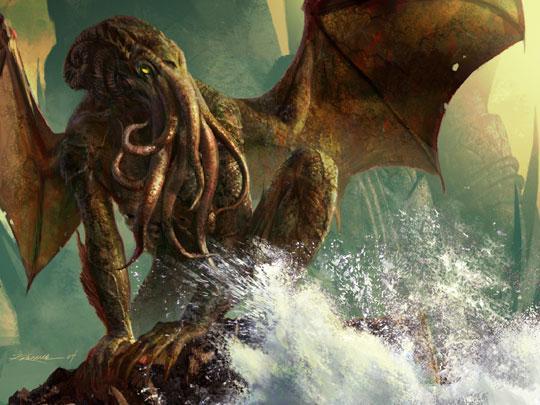 Lastly, the title itself is a fascinating onion of meaning. "Squid" can probably only refer to one thing--Cthulhu (although slang may also be at play: slowness or ineptitude from CA, which is where the author was from; and Urban Dictionary's overestimating one's abilities, which may refer to Cthulhu, Andre or Ricky).
Lastly, the title itself is a fascinating onion of meaning. "Squid" can probably only refer to one thing--Cthulhu (although slang may also be at play: slowness or ineptitude from CA, which is where the author was from; and Urban Dictionary's overestimating one's abilities, which may refer to Cthulhu, Andre or Ricky)."I have gone up to see Him, and have looked through His eyes, and I have been where He is, time without end! An I'm here to tell you, all you dearly beloved mongrel dogs of mine, I'm here to tell you that it's consumed me! My flesh and my time, have been blown off my bones, by the searing wings of His breath! I'm not far off now from eternity!"and
"I'm more alive than you will ever be, and when I'm all consumed, I'll be far more alive, and I will live forever!"Most people may want a longer--even immortal--life. How you feel about being consumed may be another story. Again, the story or Ricky's next decision is left ambiguous, but his past impulsive actions and the meaning of names might suggest where the story's headed next.
"[T]he idea I want to get across to you, is that's how short your life on this earth will have been, Guy, when you check out a year or so from now. Your whole stay on this glorious green globe will be like that bird's landing and flying off again. It'll hardly have happened at all."Carl Larken seeks unknown and/or undiscovered gods buried in the earth, seeks signs from them. The reader's not entirely sure if he's sane. Marjorie, meanwhile, trails him, and, horrified, discovers the true meaninglessness of her marching-along existence in an unfathomable cosmos.
 Shea recently passed away. The family is asking for tributes to those moved by his work.
Shea recently passed away. The family is asking for tributes to those moved by his work.POLLINGER’S NOTEBOOK: YEARS 4.3 – 6.4 By Mark Burgh
PROMISED LAND By Rebecca Ann Jordan
MEN ARE NOT DRAGONS By Stephen V. Ramey